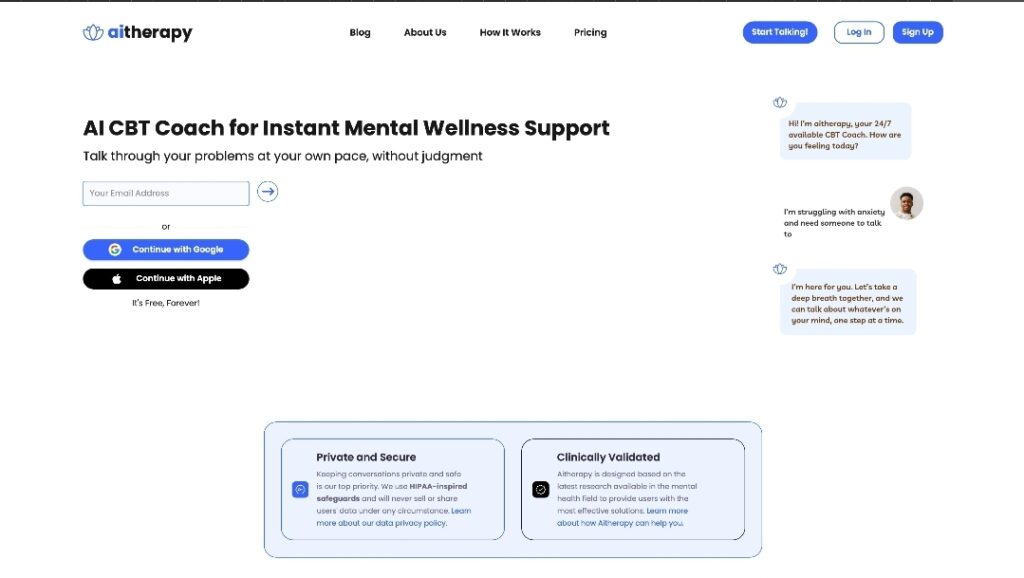In today’s fast-evolving digital landscape, customer experience (CX) is dramatically reshaped by technological advancements, especially AI. Few understand this better than Ali Yilmaz, Co-founder and CEO of Aitherapy, an innovative platform making accessible and affordable mental health support a reality through AI-powered therapy solutions. With a background in product leadership and AI advisory, Ali brings a unique perspective on merging cutting-edge technology with compassionate care to redefine user engagement and trust in deeply personal spaces. On cxquest.com, this exclusive interview delves into how Aitherapy’s CX strategy leverages AI to dissolve traditional barriers like waitlists and stigma, creating seamless, stigma-free access 24/7. Ali shares insights on building trust in AI-powered therapy, integrating user feedback into product development, and his vision for the future of AI in healthcare. This conversation is essential reading for CX professionals, technology strategists, and mental health advocates aiming to harness AI for transformative customer experiences.
Welcome, Ali Yilmaz, Co-founder and CEO of Aitherapy.
Q1. What inspired you to co-found Aitherapy, and how does AI shape your approach to customer experience in mental health?
AY: Aitherapy started from a very personal moment in my life. I had just been promoted into a senior product role, and instead of feeling confident, I felt completely overwhelmed. I was dealing with anxiety, overthinking, and pressure that I did not know how to manage. I tried therapy but I could not find anyone with availability, and the self help CBT books I was reading only helped to a point. I remember sitting one night thinking that I needed something I could talk to right now. That is when I decided to build it myself. I wanted an AI that could combine CBT with real conversation so people like me could get the help in the moment they actually need support.
AI shapes our approach by letting us respond at the exact speed emotions move. When someone is stressed or spiraling, they do not want to wait for a session. They want clarity right now. Our job is to make the technology feel human enough that the person feels calm, understood, and supported from the very first message.
Q2. How does Aitherapy use AI to create a more accessible and affordable mental health support system?
AY: The biggest advantage AI brings is speed. When people feel overwhelmed or anxious, they need support right now, not next week. Aitherapy gives users immediate CBT based guidance at any hour, which removes one of the biggest barriers in mental health.
AI also allows us to keep the service affordable while still providing a structured, professional level approach. Traditional therapy is powerful but expensive and hard to access. Aitherapy gives people a way to get help daily without the financial pressure.
AI-Powered Therapy: Key Features of Aitherapy
Q3. Could you describe the key features of Aitherapy that enhance user engagement and trust?
AY: Trust starts with privacy. We made privacy and HIPAA aligned safeguards the foundation of the product. People open up only when they feel safe.
The second part is engagement through structure. CBT has a repetitive nature, and while that structure works, people often do not enjoy the feeling of repetition. We redesigned the conversational flow so the talking points feel fresh while keeping the therapeutic logic intact. This keeps users engaged without losing the science behind Aitherapy.
Q4. How do you ensure the ethical use of AI in providing therapy, especially around data privacy and emotional sensitivity?
AY: We designed Aitherapy with strict rules around emotional sensitivity. One of the earliest decisions was to avoid long overwhelming responses. At first we believed people wanted detailed validation, but we learned that users already assume AI understands them. What they really want is clarity and calm, not paragraphs of emotional explanation.
On the privacy side, we aligned with HIPAA style safeguards from day one. Even though Aitherapy is not a medical provider, we chose to follow those standards because users deserve to know their emotional data is protected. People trust us with their most private thoughts and we take that responsibility seriously.
User Feedback
Q5. What role does user feedback play in iterating and improving your platform’s customer experience?
AY: User feedback is everything. One of the biggest improvements came directly from users telling us that the CBT steps felt too repetitive. The structure is supposed to repeat, but the experience should not feel that way. That feedback pushed us to redesign the flows so the CBT logic stays intact but feels more natural and human. Every improvement we make starts from conversations with users.
Q6. What challenges did you face in convincing users to trust AI for such a personal service as therapy, and how did you overcome them?
AY: The biggest hesitation was privacy. People were worried about sharing their thoughts with an AI. We overcame this by being very transparent about how we store data, how we protect it, and by building the product around HIPAA aligned safeguards. We also let users try the product freely which helped them see how caring and grounded the experience is. Once people experience the system, their fear usually turns into relief.
Success Story
Q7. Can you share a success story where AI-driven CX significantly impacted a user’s mental health journey?
AY: One of our users shared that Aitherapy became their main support system while recovering from a serious accident. They struggled with sleepless nights and physical pain, and the ability to talk to Aitherapy at two in the morning made a real difference. They said it helped them see their challenges more clearly, guided them through tough emotions, and gave them strategies that worked better than anything they had tried before. That message also reminded us why we built this.
Q8. How do you see AI evolving in the mental health sector over the next decade?
AY: AI will bring hyper personalized daily guidance. Instead of mental health being a weekly appointment or something you think about only during a crisis, support will become part of everyday life. AI will learn your patterns, your thinking habits, and your triggers in a responsible way and give you constant small adjustments. This will help people stay above the emotional threshold that leads to more serious challenges.
Q9. What advice would you give CX leaders aiming to implement AI-driven innovations in their sectors?
AY: My advice is simple. Do not underestimate human intelligence. People know when something feels fake or shallow. AI works best when it respects the user, not when it tries to replace them. Build with honesty, clarity, and real care. If the experience makes the person feel understood, you are on the right track.

Closing
Ali Yilmaz’s vision for Aitherapy exemplifies the power of AI not just as a technology but as an empathetic enabler of human-centered customer experiences. By dismantling barriers traditionally entrenched in mental health care, Aitherapy opens new pathways for immediate, affordable, and stigma-free support. Ali’s leadership highlights that successful AI-powered therapy is not only about innovation but trust, ethics, and continuous learning from the users themselves. As digital transformation accelerates across industries, his insights illuminate a future where AI enables deeper connections rather than replacing human sensitivity. This exclusive interview provides CX practitioners with invaluable perspectives on designing AI-driven experiences that truly resonate and empower users. Visit cxquest.com for the full interview and explore how AI innovations like Aitherapy are setting new standards for customer experience in healthcare and beyond.

